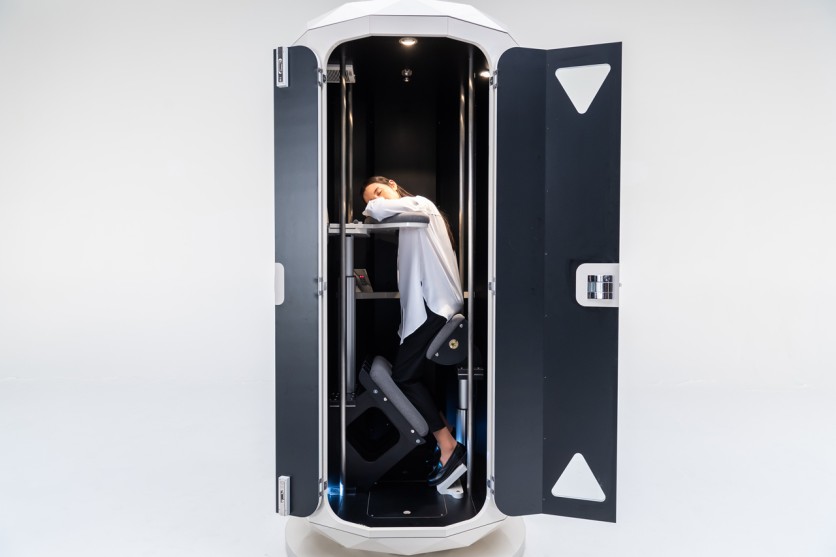KOYOJU Plywood Corporation has introduced "giraffenap" - a unique nap box designed for upright slumber. This unconventional approach to rest aims to redefine work style dynamics and boost productivity.
The origins of this project can be traced back to a licensing agreement forged during the "Intellectual Property Business Matching" event, orchestrated by Hokuyo Bank, Ltd.
Itoki Co., Ltd. shared its open patent titled "Human body storage structure and sleep housing," setting the stage for this innovative release. KOYOJU Plywood has been crafting the product and has unveiled the dedicated giraffenap service site.

The Giraffenap
The "giraffenap" offers a space where individuals can find respite in a standing position. Promising rejuvenation in just 20 minutes, it aspires to reinvigorate performance and dispel the weariness amid a busy day.
By providing a space for a brief standing nap, it aims to address employee well-being and efficiency in the workplace. Collaborative research with Hokkaido University and Taiwan's National Cheng Kung University has shown that standing naps lead individuals into sleep stage 2, a state conducive to light breathing.
Participants have sustained this phase for over 30 minutes, allowing for a refreshing nap without the grogginess, enabling a swift return to work with renewed vigor.
The design relies on four contact points: head, buttocks, shins, and soles. This configuration ensures that maintaining a relaxed standing and sleeping posture is effortlessly achieved regardless of strength.
The nap box, similar to a petite public phone booth, makes efficient use of space. Compared to the installation of a bed, it is designed to be a resourceful and compact solution to introduce a nap-friendly environment in any setting.
Japanese Sleep Patterns
It's also reported that Japanese sleep patterns differ from global norms. According to the 2021 OECD survey, the average sleep duration for Japanese citizens is 7 hours and 22 minutes, the shortest among 30 member nations.
This discrepancy of nearly an hour from the global average of 8 hours and 24 minutes highlights a widespread tendency for shorter rests. The Ministry of Health, Labor and Welfare's "2021 Health Survey Report" further underscored this trend, revealing that 67.7% of individuals get 7 hours or less of sleep.
KOYOJU noted that the scarcity of shut-eye often leads to daytime drowsiness, reduced concentration, and increased forgetfulness. In response, giraffenap seeks to address this issue by providing a unique solution for rejuvenation and focus.
Based on research conducted by NASA, a short 26-minute nap results in a remarkable 34% boost in pilot performance and alertness, coupled with a 16% enhancement in reaction time.
This underscores the wide-ranging advantages that napping can offer, spanning from recuperating from fatigue and reducing stress to sharpening focus, enhancing memory and cognitive functions, and fostering a more positive mood.
Related Article : International Technology Company Eybna Empowers the Next Generation of Wellness Products with Receptor-Specific Formulations

![Apple Watch Series 10 [GPS 42mm]](https://d.techtimes.com/en/full/453899/apple-watch-series-10-gps-42mm.jpg?w=184&h=103&f=9fb3c2ea2db928c663d1d2eadbcb3e52)



